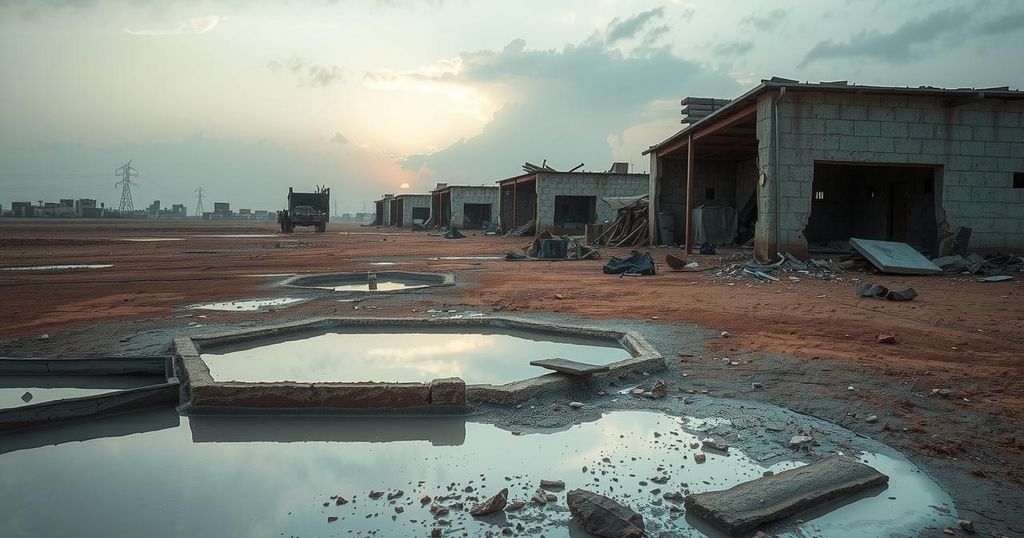Cholera Outbreak in Sudan: Over 170 Deaths Amid Deepening Crisis
Sudan faces a severe cholera outbreak, with 172 confirmed deaths and over 2,500 illnesses reported recently, primarily in Khartoum and Omdurman. Poor sanitation and access to clean water exacerbate the crisis as displaced populations return amid ongoing civil war. The situation is complicated by the collapse of health facilities and the emergence of other diseases like dengue and meningitis.
In Sudan, a cholera outbreak has swept across Khartoum and Omdurman, resulting in 172 fatalities and over 2,500 reported illnesses in just one week. As displaced residents return to their homes amidst a collapsing infrastructure—frayed by years of civil war—the lack of access to clean water leaves them vulnerable to the disease.
The latest figures, issued by the Health Ministry, indicate a sharp increase in cholera cases, with reports averaging 815 daily from May 15 to 25. UNICEF stated that since the beginning of this year, the number of cholera diagnoses has skyrocketed to more than 7,700. More than 1,000 of those affected are children under four years old, with cases also emerging in five neighboring provinces.
Joyce Bakker, Sudan coordinator for Doctors Without Borders, described the situation as dire. Treatment centers in Omdurman face overwhelming patient loads, with some individuals arriving at clinics in critical condition. “Scenes are disturbing… Many patients are arriving too late to be saved,” she added, emphasizing that the true extent of the outbreak may remain unseen due to limited capacity to address the crisis.
The outbreak’s roots are entwined in the ongoing civil war which has decimated public health facilities and systems. After months of fighting, the military regained control of Khartoum in March, prompting around 34,000 displaced people to return home only to often find their properties damaged and basic necessities, like clean water, in scarce supply. Dr. Rania Elsayegh from Sudan’s Doctors for Human Rights remarked that residents are resorting to drinking tainted water.
Health officials are alarmed at the potential for rapid spread in compact displacement centers where many have gathered. With approximately 80% of hospitals out of commission, remaining facilities lack adequate supplies and resources necessary to provide care. Dr. Sayed Mohamed Abdullah from Sudan’s Doctors Union voiced concerns about the overwhelming shortage of water, electricity, and essential medications.
Cholera is identified by the World Health Organization as a “disease of poverty,” flourishing where sanitation is subpar. The bacterium Vibrio cholerae is primarily responsible for this diarrheal disease, which can be treated effectively but can also become fatal within hours if unchecked. Global cholera outbreaks have surged since 2021 due to rising poverty, conflict, and climate-related disasters.
In Sudan, the civil war has unleashed chaos since it began in April 2023, leading to an estimated 24,000 deaths and displacing over 14 million people. Conditions have worsened as floods annually ravage infrastructure, leaving communities even more susceptible to outbreaks.
While cholera is not new to Sudan, previous outbreaks have also been devastating. In 2017, cholera claimed at least 700 lives and sickened approximately 22,000 individuals in just two months. The recent conflict has led to recurrent cholera outbreaks across the nation, with thousands affected and scores dead in recent years.
Adding to the public health crisis, other illnesses like dengue fever and meningitis have emerged, with the latter resulting in deaths amid rising caseloads.
The cholera outbreak in Sudan, particularly affecting Khartoum and Omdurman, reflects the devastating consequences of the ongoing civil war. Lack of access to clean water and a failing health infrastructure are fueling this public health crisis. With thousands affected and deaths occurring rapidly, the situation demands urgent attention as the humanitarian crisis deepens amidst concurrent outbreaks of other diseases.
Original Source: www.newsday.com




Post Comment